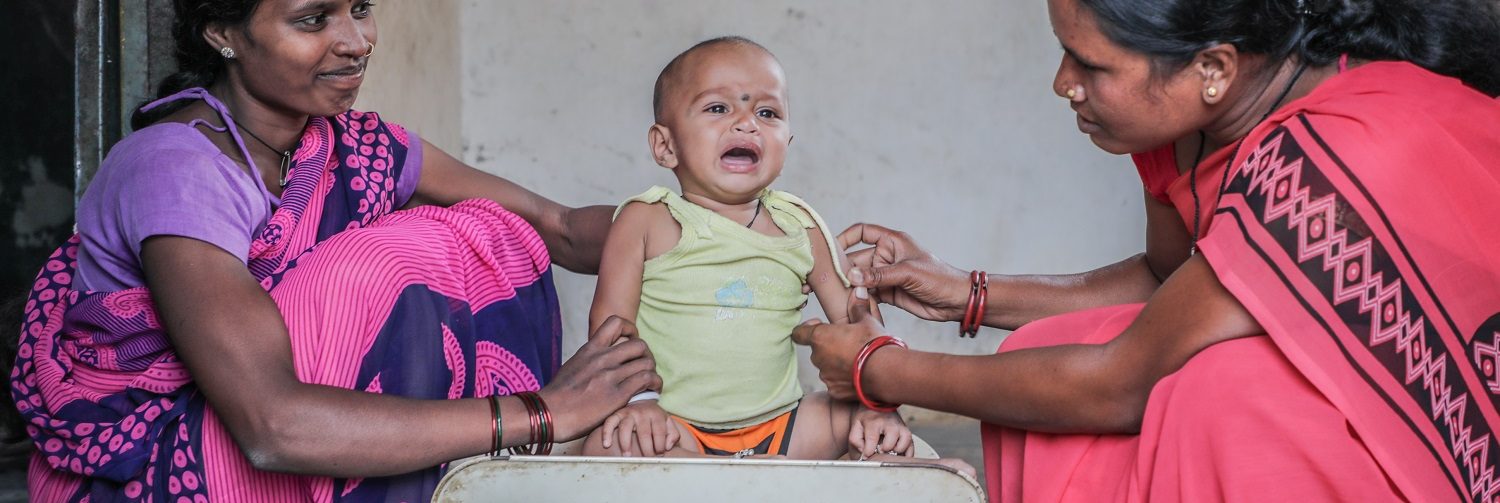 The International Food Policy Research Institute’s (IFPRI) Partnerships and Opportunities for Strengthening and Harmonizing Actions for Nutrition (POSHAN) is a nutrition knowledge/evidence initiative that began in 2011 to (1) support policy and program decisions related to nutrition using data and evidence, and (2) strengthen the capacity to produce and use evidence as well as create demand for it. On April 14, 2023, IFPRI convened partners and stakeholders to examine priorities for evidence for improving nutrition in India, exchange insights, and seek opportunities for collaboration. Approximately, 73 stakeholders from 25 organizations attended this convening.
The International Food Policy Research Institute’s (IFPRI) Partnerships and Opportunities for Strengthening and Harmonizing Actions for Nutrition (POSHAN) is a nutrition knowledge/evidence initiative that began in 2011 to (1) support policy and program decisions related to nutrition using data and evidence, and (2) strengthen the capacity to produce and use evidence as well as create demand for it. On April 14, 2023, IFPRI convened partners and stakeholders to examine priorities for evidence for improving nutrition in India, exchange insights, and seek opportunities for collaboration. Approximately, 73 stakeholders from 25 organizations attended this convening.
Recapping the journey of IFPRI-POSHAN
Purnima Menon, Senior Director, Food and Nutrition Policy, IFPRI described IFPRI-POSHAN's decade-long journey wherein evidence for nutrition was generated by analyzing data from publicly available large datasets, conducting implementation research, and by co-creating various peer-and non-peer-reviewed knowledge products. Findings from the learning assessments of this 10-year journey indicate that IFPRI-POSHAN improved the availability, accessibility, and utilization of relevant nutrition knowledge among policy and program communities in India.
New phase of IFPRI-POSHAN
Next, Rasmi Avula, Research Fellow at IFPRI, explained the vision for the next three years of work under this initiative, wherein evidence generation, synthesis, and mobilization will continue to be grounded in partnerships, and centered on three topical areas: (1) Malnutrition across the life course; (2) Anemia; and (3) Emerging solutions for nutrition challenges. IFPRI along with partners will co-develop evidence-based products, create opportunities for cross-learning through co-organizing learning events along with facilitating development of a cadre of nutrition leaders.
Setting research priorities
Samuel Scott and Rasmi Avula set the stage for defining the research priorities. To date, IFPRI along with partners conducted research on topics of policy and programmatic interest that advances knowledge on maternal and child nutrition in India. On the outcomes, we have examined the drivers of successful stunting reduction at subnational levels and examined drivers of anemia at the national level. Our research on coverage of nutrition interventions across the life-course has focused on shedding light on equitable coverage with quality. Most of the recommended interventions are in the policy framework and their coverage improved in the last decade. Gaps in coverage across the wealth quintiles declined as well for most interventions. There is, however, variability in coverage by lifestage, geographies, and we have learned that these variations could be due to state level programs and implementation differences. We have also examined convergence of interventions on the first 1000-day households and expanding this to beyond the health and nutrition interventions and found it to be very low. There is a need to further deepen our understanding of these aspects to find context-specific solutions. Our research on maternal and child nutrition focused on characterizing the trends and in reach of interventions, diets their determinants and testing of solutions. Through this work we found there are gaps in the overall reach of interventions. Their uptake is also influenced by multiple demand and supply –side factors. Maternal and child diets are suboptimal. Complementary feeding practices remain unacceptably low, and it requires the collective attention of the nutrition community. Samuel Scott, Research Fellow, IFPRI highlighted that anemia and adolescent nutrition, and diets are persistent, complex problems that require multisectoral solutions, and posited ways that IFPRI’s intends to work with partners on these areas. The next phase of this initiative will continue to tackle these various ‘unfinished agendas’ and expand to include adolescence as a primary ager-group of interest.
Working with partners
Representatives from the International Institute for Population Sciences (IIPS), National Institute of Nutrition (NIN), National Centre of Excellence and Advanced Research on Anemia Control (NCEAR-A), Campbell South Asia, and International AIDS Vaccine Initiative (IAVI) shared their vision for working with IFPRI-POSHAN. IIPS and NIN shared the details of partnership with IFPRI-POSHAN and how they are co-creating knowledge and evidence to improve malnutrition across the life course. NCEAR-A, Campbell South Asia, and IAVI shared their work with IFPRI under anemia.
Esha Sarswat, Senior Communications Specialist, presented the methods and plan for knowledge mobilization, capacity strengthening, and technical support for the next three years.
Hearing from our partners
Representatives from Indian Council for Medical Research (ICMR), Campbell, CARE, UNICEF shared their insights on the importance of collaboration in nutrition research, particularly in resource-constrained settings, as Dr. Shirshendu Mukherjee from Biotechnology Industry Research Assistance Council (BIRAC) facilitated the discussion. Effective communication and collaboration were identified to be the need of the hour for strengthening our collective understanding of issues and for identifying appropriate solutions. Stakeholder alignment, the need for openness and advocacy through evidence-based research were highlighted to be important. The panel also noted the importance of translating research into accessible products and leveraging technology such as smartphones to reach a larger audience for disseminating evidence.

